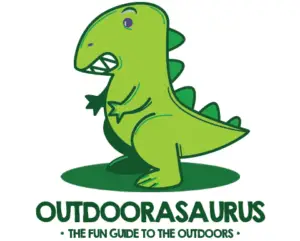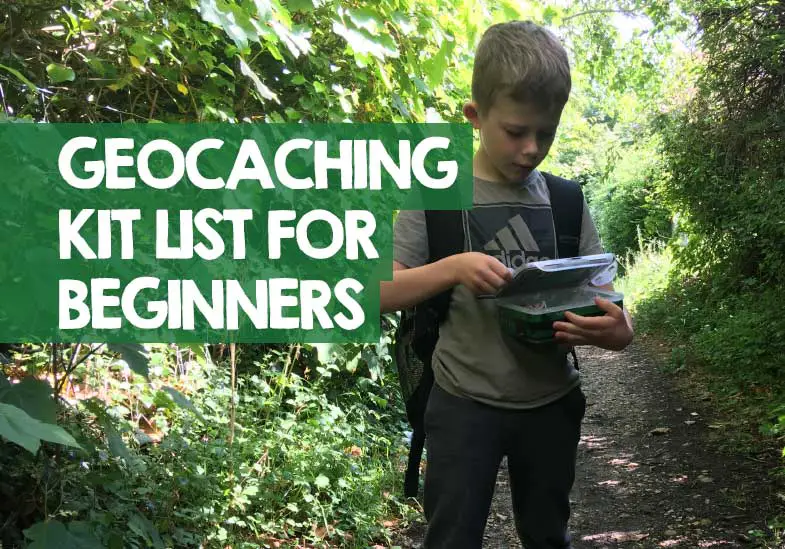Over the last month, my 7 year old son and I have started geocaching as our new hobby. Despite what you might have heard, you don’t need a load of expensive gear as beginner. In fact, most people can put together a geocaching kit list with things they already have around the house and get started today.
If you want to get going to see what it’s like, I’ve compiled a list below of what you need to start geocaching. A lot of this gear I would imagine you already have so please consider it a geocaching kit list for beginners – it’s based on what we’ve been using since we started. Much of it is actually optional gear.
Honestly, you don’t need anything expensive to start geocaching for the first time.
Geocaching kit list for beginners
Below you can see what you will need to go geocaching. It’s the perfect cheap equipment list or gear if you’re just getting started with this amazing outdoor hobby… there are some optional items in here too which I will explain as we go!
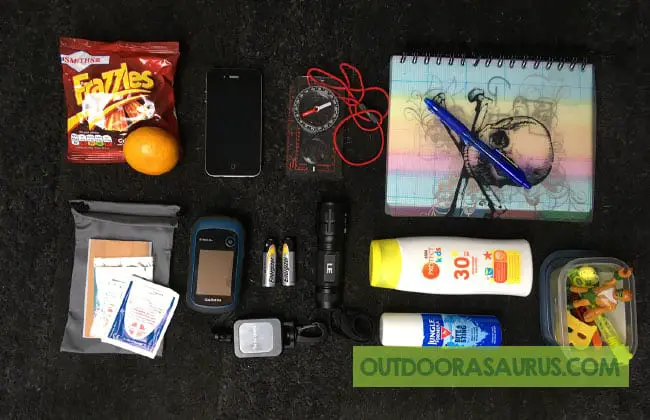
1. Smartphone (or handheld GPS)
When we decided we were going to start geocaching I got all excited and went out and bought a Garmin eTrex 22x handheld GPS (view on Amazon). I had visions of my son and I lost in dense woodland, trapped in valleys, and trying to navigate ourselves out with the aid of high-tech GPS unit.
Guess what? We haven’t needed it… yet!
As beginners, we’ve found that the Geocaching.com smartphone app works just fine for us on my Apple iPhone to navigate around our local town. It’s easy to use, simple to search for caches, and then navigates you towards the cache in a straight line – so you will need to find a way around obstructions on route.
Occasionally we have found that the reliability of the positioning hasn’t been great, but overall, it’s been accurate enough for us to get started in geocaching.
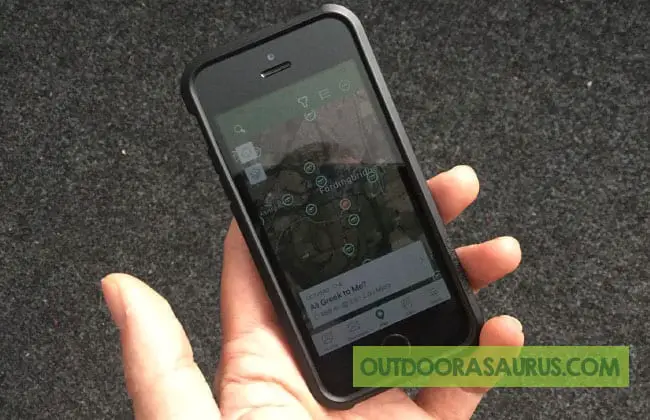
We do still take the Garmin handheld with us though in case my smartphone runs out of battery or can’t navigate for any reason. We also pack a spare couple of batteries for the handheld GPS too, just in case of a power drain there too.
I would imagine that as we get more into the sport and more adventurous out in forests, our Garmin handheld will become a more integral part of our geocaching kit list. For now though, the smartphone app works just fine for the level we’re at – urban geocaching for beginners.
2. Snacks and a drink
After we have found a few geocaches in our local forest and walked a good distance, my son will soon start complaining he’s tired and hungry… and who can blame him?
That’s why I place food and drink supplies second in my kit list of equipment of what you need to take geocaching.
3. Swag for trading
When you find a cache, you will notice that most times there is some kind of small trinket or toy in there. They don’t tend not to be of huge value, with the ones we’ve found so far being on the same level of a free McDonald’s toy or something you might find in a Christmas cracker.
These swag items you find in the geocaches is what really helps this outdoor activity appeal to kids, as it makes the GPS treasure hunt so much more exciting.
You are allowed to trade equally or trade up with what you find in a geocache, so take your own swag for trading in your geocaching kit.
My son has put a little plastic container together with a few items in there like mini-figures, Lego men, and some fridge magnet letters.
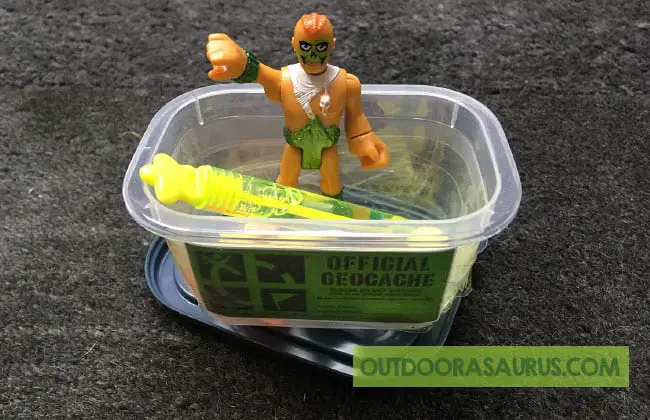
Don’t ever forget to take your swag when you go geocaching because you will want to swap something if your kid loves what you find!
4. Logbook and pen
You also need to take a paper pad and pen with you geocaching for a couple of reasons.
Firstly, it means you can make a record of what geocaches you found with any handwritten notes. You can then copy those notes to the official online Geocaching.com log when you get home.
Of course, this functionality is built-in to the app if you’re using a smartphone, so you can log them digitally as you go. There’s no harm in logging them manually too – my son loves doing this when he gets home in his little paper pad.
Another reason for taking a paper pad and pen is that there is meant to be paper logbooks in the caches for you to sign and date.
We’ve often found that the logbooks in the caches will either be full up with entries, damp, missing, or there won’t be a pen or pencil in the cache. By having our own paper pad and pen we can tear out a piece of paper and start a new log in the cache for the next finder.
5. Flashlight
We’ve not had to use a flashlight or torch yet, but it’s something my son wanted to take in his geocaching kit bag.
I am sure there will be a time when we need to use this piece of geocaching equipment, especially as the winter months move closer and it gets darker.
There are some geocaches on our target list which we think are hidden in some darker places, so it’s best to be prepared. You might find that you are still out hunting for caches after dark too!
Again, you might not need one yourself as most smartphones these days come with a flashlight functionality on them anyway. If you want to buy one like ours for your geocaching kit bag, here’s a flashlight on Amazon.
6. Sunscreen and bug repellent
It’s the height of summer where we are right now, so it always pays to be ready for a day out geocaching amongst the biting bugs and strong UV rays.
7. First aid kit
What intrepid explorers wouldn’t go on a trek without a first aid kit? And believe me, when you have kids with you, you’re going to need it!
We don’t have huge amounts in our first aid kit, just a few plasters and antibacterial wipes. It’s helped recently as my son fell over due to excitement of finding a new cache, tearing his clothes and getting some cuts and grazes in the process!
8. Compass
This is not essential by any stretch as your smartphone app or handheld GPS will point you in the right direction.
However, I have a 7 year old who has a real sense of adventure. He feels like he’s a proper explorer when he has a compass around his neck. You can buy the same compass we use on Amazon.
There is a valid reason to have a compass in your geocaching kit bag though; if your tech gear fails you, you can still hunt for geocaches the old-fashioned way – you might still need a paper map though!
9. Gloves
To be honest, I always forget to bring gloves in our geocaching kit but wish I did remember. Many of the caches we have found involve digging around in bushes and brambles, so I tend to come back home with scratches on my hands and arms.
10. Rucksack to put it all in
And finally, you need to take a rucksack geocaching to put all your equipment, gear, and swag into. As you can see, my son loves Minecraft and he wants to be in charge of our kit bag… I usually end up carrying it though!
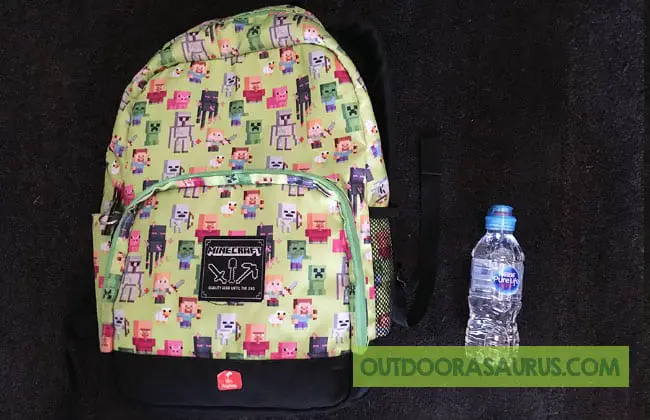
Some obvious equipment you need to take geocaching
Lastly, there are some just plain obvious gear you need to go geocaching with, and I almost feel ridiculous telling you this, but here goes:
- Waterproofs: We live in the UK and you never know what the weather holds. It can literally change from sun to rain in the blink of an eye.
- Sensible footwear: Many geocaches won’t be in urban areas, so it pays to wear shoes suited to the environment you’re GPS treasure hunting in.
Conclusion
Geocaching is a very simple activity, and there will be caches local to you that don’t require any extreme walking or terrain. The truth is, if you want to get started with your kids as a beginner, all you really need to take geocaching is a smartphone with the app on it – that’s all you need (and a sense of adventure).
As you get more interesting in geocaching, then there might come a time when you do decide to invest in a handheld GPS like the one I have (shown below).
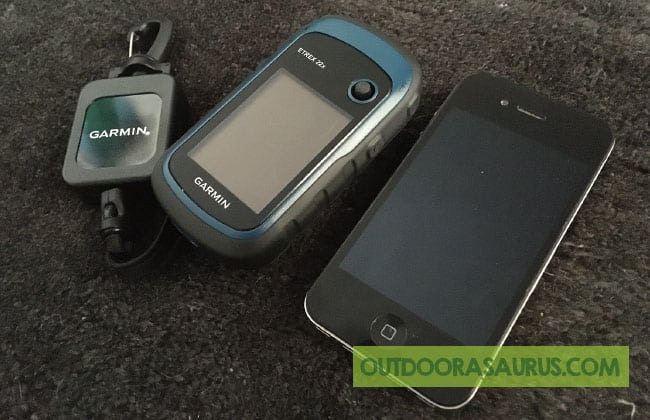
However, it’s a simple outdoor pursuit that keeps you fit and entertained and kids love – and that simplicity extends into what you should bring geocaching as a beginner in your kit bag.
And one final word: once you find your first geocache you will no longer be a muggle and will now have your eyes opened to a fascinating world of treasure hunting that you never even knew existing in the woods and streets that surround you!
You might also like…
I love geocaching and have written up additional guides and articles of how to do it, and what to expect. Here’s a selection:
